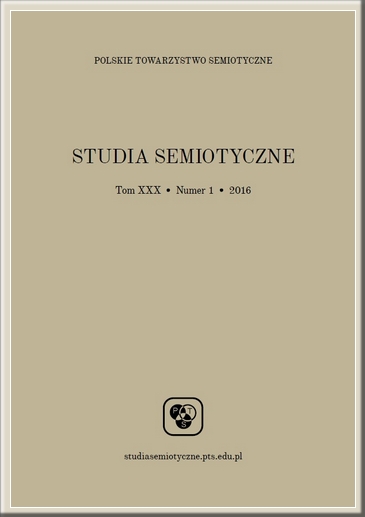Abstrakt
DOI: http://doi.org/10.26333/sts.xxx1.05
Celem artykułu jest wyróżnienie dwóch, funkcjonujących w języku potocznym sensów wyrażenia „widzieć” – obiektywnego i subiektywnego bez jednoczesnego przypisywania obserwatorom przekonań. Celem jest zatem ekstensjonalna eksplikacja. Pozwala to na opisywanie percepcji wzrokowej bez przesądzania o wyższych zdolnościach kognitywnych podmiotu percepcji. Wprowadzenie przekonań obserwatora pozwala następnie na wyrażenie większej ilości rozróżnień występujących w literaturze poświęconej filozoficznym zagadnieniom percepcji zmysłowej.
Bibliografia
Anscombe, G. Elizabeth M. (1981a), The Intentionality of Sensation: A Grammatical Feature, w: The Collected Philosophical Papers of G.E.M. Anscombe, t. 2, s. 3–20.
Anscombe, G. Elizabeth M. (1981b), The Subjectivity of Sensation, w: The Collected Philosophical Papers of G. E. M. Anscombe, t. 2, s. 44–56.
Bermudez, José Luis (2003), Thinking Without Words, New York: Oxford University Press.
Block, Ned (2003), Mental Paint, w: M. Hahn, B. Ramberg (eds.), Reflections and Replies: Essays on the Philosophy of Tyler Burge, Cambridge (MA): MIT Press.
Byrne, Alex, Logue Heather (2008), Either/Or, w: A. Haddock, F. Macpherson (eds.), Disjunctivism: Perception, Action, Knowledge, Oxford: Oxford University Press, s. 57–94.
Cohen, Jonathan (2010), Perception and Computation, „Philosophical Issues” 20: Philosophy of Mind, s. 96–122.
Crane, Tim (1995), The Mechanical Mind, New York: Routledge.
Dretske, Fred I. (1969), Seeing and Knowing, Chicago: University of Chicago Press.
Dretske, Fred I. (1996), Phenomenal Externalism, „Philosophical Issues” 7: Perception, s. 43–158.
Dretske, Fred I. (2000), Perception, Knowledge and Belief. Selected Essays, Cambridge: Cambridge University Press.
Fish, William (2009), Perception, Hallucination, and Illusion, New York: Oxford University Press.
Fujita, Kazuo, Blough, Donald S., Blough, Patricia M. (1991), Pigeons see the Ponzo illusion, „Animal Learning and Behavior” 19, s. 283–293.
Grice, Herbert Paul (1961), The Causal Theory of Perception, „Proceedings of the Aristotelian Society, Supp.” Vol. XXXV, s. 121–53.
Glock, Hans-Johann (2000), Animals, thoughts, and concepts, „Synthese” 123, s. 35–64.
Haack, Susan (1993), Evidence and Enquiry. Towards Reconstruction in Epistemology, Oxford: Blackwell.
Kim, Jaegwon (1995), Dretske’s Qualia Externalism, „Philosophical Issues” 7: Perception, s. 159–165.
McDowell, John (1994a), The Content of Perceptual Experience, „Philosophical Quarterly” 44, s. 190–205.
McDowell, John (1994b), Mind and World, Cambridge (MA): Harvard University Press.
McDowell, John (1998), Response to Peacocke, „Philosophy and Phenomenological Research” 58, s. 414–419.
Peacocke, Christopher (1998), Nonconceptual Content Defended, „Philosophy and Phenomenological Research” 58, s. 381–388.
Ponzo, Mario (1911), Intorno ad alcune illusioni nel campo delle sensazioni tattili sull’illusione di Aristotele e fenomeni analoghi, „Archives Italiennes de Biologie”.
Robinson, Howard (1994), Perception, London: Routledge.
Stich, Stephen P. (1978), Do Animals Have Beliefs? „Australasian Journal of Philosophy” 57, s. 15–28.
Strawson, Peter F. (1979), Perception and its objects, w: G.F. Macdonald (ed.), Perception and identity: Essays presented to A.J. Ayer, London: Macmillan.
Tye, Michael (1995), Ten Problems of Consciousness, Cambridge (MA): MIT Press.
Tye, Michael (2006), The Thesis Of Nonconceptual Content, w: C. van Green, F. de Vignemont (eds.), European Review of Philosophy, Vol. 6: The Structure of Nonconceptual Content, s. 7–30.


